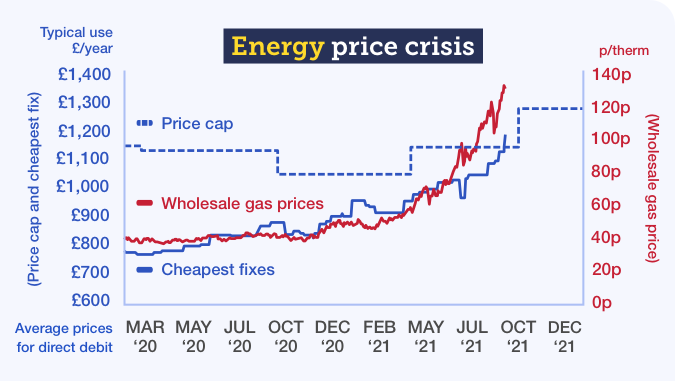Martin's WARNING: Your energy bill's about to JUMP by £100s.
The cheapest deals cost 40% more than a year ago, and are still rising. Fail to act & you'll face a huge bill SHOCK. My 11 need-to-knows
 This autumn's signature noise will be a deep thud... the sound of jaws hitting the floor, as people finally see the practical evidence of the energy bill catastrophe laid bare.
This autumn's signature noise will be a deep thud... the sound of jaws hitting the floor, as people finally see the practical evidence of the energy bill catastrophe laid bare.
The team and I have long warned you this will be coming, and now, sadly, we're there, it's happening. Below I've my 11 key need-to-knows to get you through this, but if you don't have time then read this box...
| If you do nowt else...
Whether you're direct debit or prepay, do a quick Cheap Energy Club comparison or use our easier Pick Me A Tariff tool ASAP. Don't expect to pay less than you have been though, this is about minimising the explosive rises most will face. |
1. In just 16mths, we've gone from the lowest rates for years to the highest
In May last year, wholesale prices - those that energy firms pay - were at record lows as countries locked down and demand plummeted.
The speed of change since is incredible. Wholesale UK electricity prices have hit their highest rates since the market was formed in 1990, as the world economic reboot has heightened demand. Gas prices are at 15yr highs too, after a cold European winter saw stores depleted.
As a result, cheap deals have disappeared... last year the cheapest fixes for those with typical use were in the £700s, now few are below £1,200/yr.

2. Huge hikes are officially sanctioned. The price cap rises by £140/yr on 1 Oct - hitting millions. And it'll likely rise again after that
The majority of homes in England, Scotland and Wales (Northern Ireland is different, see NI energy help) are on standard tariffs, dictated by the regulator Ofgem's price cap. In reality, this isn't actually a cap on price, but on rate, as the more you use, the more you pay.
On 1 Oct, the cap will rise by an average 12% for those on billed meters and 13% for those on prepay meters. All big-name energy firms are pushing their standard rates to the max.
To put that in context, for someone on typical use today the cap is £1,138/yr. From 1 Oct, it will be £1,277/yr. So £100 a month will be less than the average.
The cap lasts six months. It'll change again in April. It's set based on wholesale prices over an assessment period. That's already started for April, and so far it looks like it'll rise again. (See our price cap FAQs for more on how the cap works.)
TOP TIP: Did you compare when the price cap news was announced? If so, you will have been given the wrong price. When Ofgem announced the new rate on 6 Aug it made the news and newspaper headlines, so people rushed to do comparisons.
Yet for those on standard tariffs, the results would've been underplayed as the new prices weren't yet in the databases (comparison sites can't update prices until the firms announce their specific changes - normally a couple of weeks after Ofgem). So even if you did it then, compare now to see the real results.
3. Are you with British Gas, E.on, EDF, Scottish Power or SSE on a standard tariff? Even if savings are small, lock into a cheap fix now to protect against the likely FUTURE hike
The price given on all comparison sites is done over the next 12 months, but the price cap only lasts for six months. And as I've explained above, the mood music is that it will rise again then.
So if you do a cheap 1yr fixed comparison and you can lock in at a cheaper rate for a year, it's worth doing even if the saving is only a few quid, as the likelihood is over the next year the price cap will rise, so your real savings will be bigger.
CHEAP FIXED energy
Prices are averages based on TYPICAL direct debit use |
Energy price cap from 1 Oct
| £1,277/yr |
Cheapest 1yr fix
Sainsbury's Energy (operated by E.on Next) | 12mth fix | £1,177/yr
Save £100/yr |
Cheapest 2yr fix (lock in for longer)
Ovo Energy | 24mth fix | £1,220/yr
Save £57/yr |
In the hoped for, but unlikely event that prices drop rapidly, you can always just leave the fix, even if you need to pay a small early-exit penalty. Yet my bet is locking in now will be a winner.
And don't worry, switching is easy, it's the same gas, same electricity and same safety. Only the customer service and who bills you changes. Your supply always stays on and no one visits your home unless you want or need smart meters. See our Switching FAQs for more help.
4. Igloo or Bulb customer? Your prices are due to jump AGAIN. These are no longer cheap
These two traditionally-cheap, good-service firms both offer a single variable tariff, and have just announced their third price hike of the year to hit on 1 Oct, in total pushing their prices up by £300/yr+ for someone on typical usage. Bulb's new price will be at the price cap, Igloo will only be £48/yr cheaper.
As it takes a few weeks for a switch to complete, do it now and you should make it just in time before the rates rise.
The new prices for Igloo are in our Cheap Energy Club comparison, so the comparison will be accurate. Bulb hasn't provided data yet, but as it's at the price cap, for a rough guess just put in British Gas's standard variable as your tariff to get a likely indication of how it compares.
5. Rolling off a cheap deal? Accept the fact you WILL PAY MORE, but don't let that stop you switching
My email bag is swamped with people angry and horrified as their cheap fixes set up a year ago are ending, and they're being asked to pay many £100s/yr more.
I'm afraid right now I've no answer to that apart from... accept it... or write to your MP. Mentally though, let go of the price you were paying. The market's cheapest fixes are a staggering 44% more expensive than this time last year - and are likely to continue to rise.
And while the cheapest variables undercut it, it's possible some are only cheap as they are about to imminently announce another hike.
The idea of 'saving' compared to what you were paying has gone for now. Yet that's not a reason to do nothing, you still need to 'save' compared to what you will pay if you don't act, as what you pay will very likely jump to the price cap if not. So get on it.
6. Got some time left on a cheap tariff? I'd stick with it, you'll likely save more than trying to switch early will gain you
If you're on a cheap fix or even a cheap variable tariff where you know you've a few months left, my best guess is inaction right now will win. Prices have risen so much that the savings you'll make by sticking with your old cheap tariff, while it lasts, will be huge (though do compare to check).
So even though prices are rising, and waiting may mean the deal you get in future may cost even more, I suspect the gain of holding on to very cheap tariffs now will likely outweigh that. It is more art than science though.
7. Beware other comparisons sites, most hide deals that don't pay them... and most cheap deals don't pay right now
Energy switching sites, including Cheap Energy Club, earn their money by being paid by firms they can process a switch for. This comes from energy suppliers' marketing budgets, so it doesn't change what you pay, you're charged the same as if you'd gone direct.
To protect their incomes, most sites by default hide any tariffs they don't have a commercial relationship with. I've always rejected that for MSE. By default, the Cheap Energy Club comparison includes all available tariffs (though you can filter, for example, for service rating).
Instead, my concept was to give switchers nearly half what we earn in the form of cashback (for instance, £25 per dual-fuel switch). Not just to make us cheaper than other sites, but also allowing us to include the cashback in the saving, so more people switch to those that pay, without us hiding any tariffs. Hopefully a win-win for us and you.
Right now, in these extraordinary times, many of the cheapest firms have pulled payments. That means most sites, by default, hide a wide range of cheap tariffs. We, of course, don't. Similar is true of free auto-switch sites, which are likely to have even fewer competitive deals than usual right now.
The main impact on MSE's service is if you've used our Pick Me A Tariff Every Year function, as we can't switch you to most of the cheapest deals. We'll still tell you what they are but you'll need to switch outside of our easy one-click service.
8. Even at these high prices, many firms claim they're selling below cost, so sadly we may see more small firms go bust
Small new firms, with less capital behind them, are more likely to be at risk in the turbulent market, as high and rising wholesale prices can seriously squeeze providers' profits.
As some firms moot they aren't making money, even at the price cap, then it's possible cheap rates are more about winning over new customers, which can be a sign of ambition or desperation - it's tough to tell.
It's a nightmare to try to pick which firm may go under, because as soon as a firm knows it's insolvent it must declare it then, so there's usually no pre-warning (never mind the libel risk).
If you do go for a firm that later goes bust, don't worry - your gas and electricity stays on and any credit is protected under Ofgem's safety net rules. Though the process of being shifted to a new supplier after can take time and be hassly.
STOP PRESS from the team: Highlighting this point, just before we sent this email, it was announced small supplier PFP Energy has gone bust, affecting 80,000. PFP customer? Here's what to do next.
9. Not all fixes are cheap, some are far higher than the price cap - beware firms' sleight of hand
I've talked about cheap fixes above, but the operative word there is CHEAP (although nothing is truly cheap right now), as only variable tariffs need to fall within the price cap.
Horrifyingly, Scottish Power has a fix lasting just over a year which is 20% higher than the new price cap. Prices would need to rise roughly 50% next April before that was worth doing - ridiculous.
And it's not alone. Other biggies, including Shell, Octopus, British Gas, EDF and SSE, all have some fixes above the price cap too (though those lasting longer are less bad). So don't just go for your supplier's fix, instead it's better to do a whole-of-market cheap fix comparison.
10. Struggling to pay your bill, and worried you need choose between heating and eating? There may be help available...
 I am very concerned about how those on lower incomes will cope with these horrific new energy prices, especially coupled with the end of the universal credit uplift and furlough ending. It is the perfect price storm.
I am very concerned about how those on lower incomes will cope with these horrific new energy prices, especially coupled with the end of the universal credit uplift and furlough ending. It is the perfect price storm.
Emergency measures put in place due to coronavirus are still ongoing. Your supply won't be cut off - standard credit meter disconnections have been suspended, while prepayment customers can get emergency credit to ensure the lights stay on.
There are also a range of options suppliers can offer, including payment plan reviews, payment breaks or reductions. This is all done case-by-case, so contact your supplier as soon as you can if you do start to struggle and let it know if you're vulnerable.
You may also be able to apply for £140 towards bills via the 2021/22 Warm Home Discount. That rate hasn't been increased for nine years, even though energy prices are 40% higher than a year ago. You needn't be Rachel Riley to see that doesn't add up.
11. It's not just about bills - use less and you pay less - obvs. Ensure you know the energy-saving myths from reality
Most people (including me sometimes) do waste energy. We know wearing jumpers, lowering thermostats and not leaving electricals on standby will help. And maybe these price hikes may change behaviour.
There are also many questions out there, such as 'should you keep the heating on all day, or only have it on when needed?' For answers, see our 18 Energy Mythbusters guide, and also the top thrifty heat-saving tips for things like how to easily make draft excluders.
PS: I'm writing all this on Monday, not our normal email-writing day (Tue) as that's Rosh Hashana - Jewish New Year, a high holiday we don't work on. Shana Tova to all celebrating.
So while the normal rule is the team don't change copy with my byline, they may need to this time, if the facts change, as I'm out of contact.
PPS: I'm back guest-presenting Good Morning Britain on Thu & Fri, see you then if you're watching (not literally obviously... TV isn't two-way).
No comments:
Post a Comment